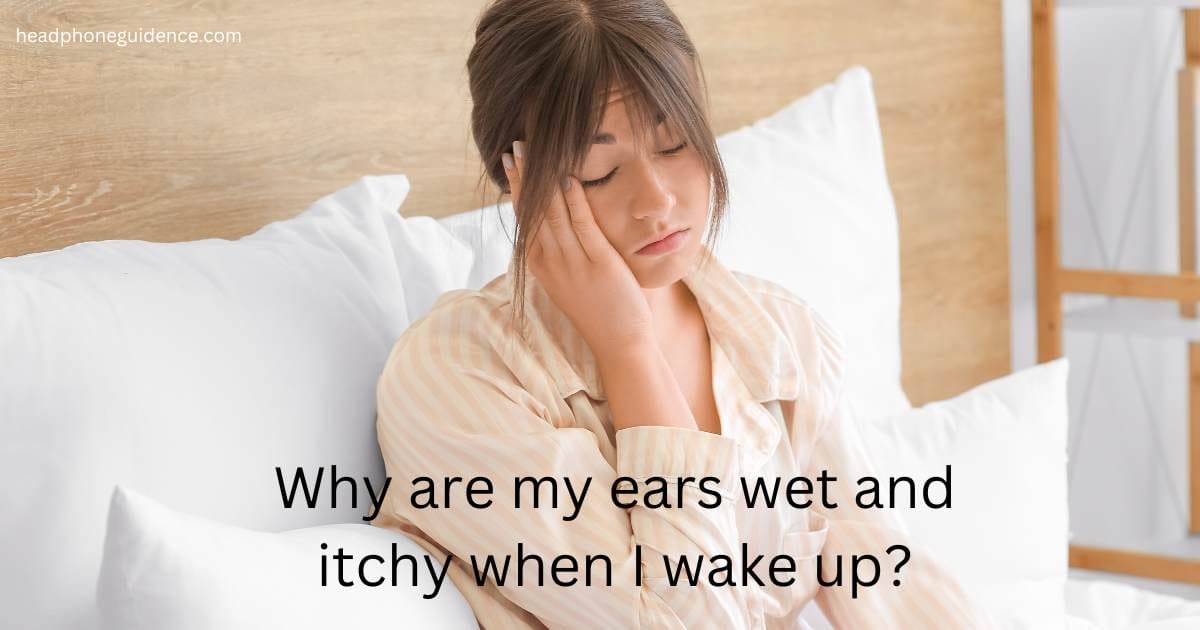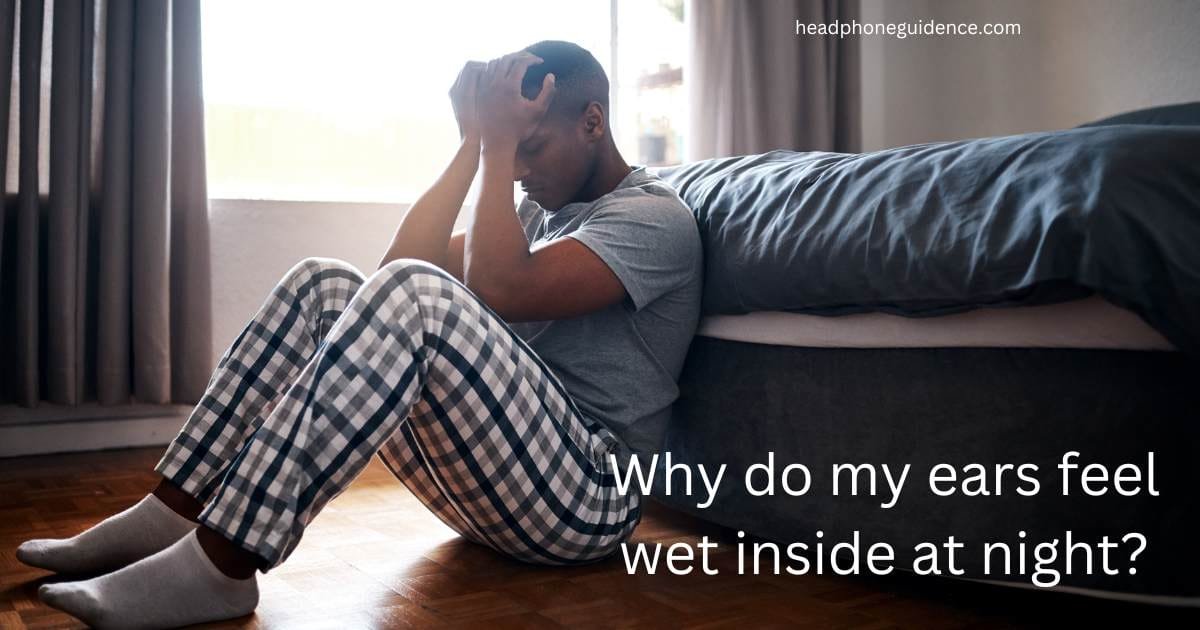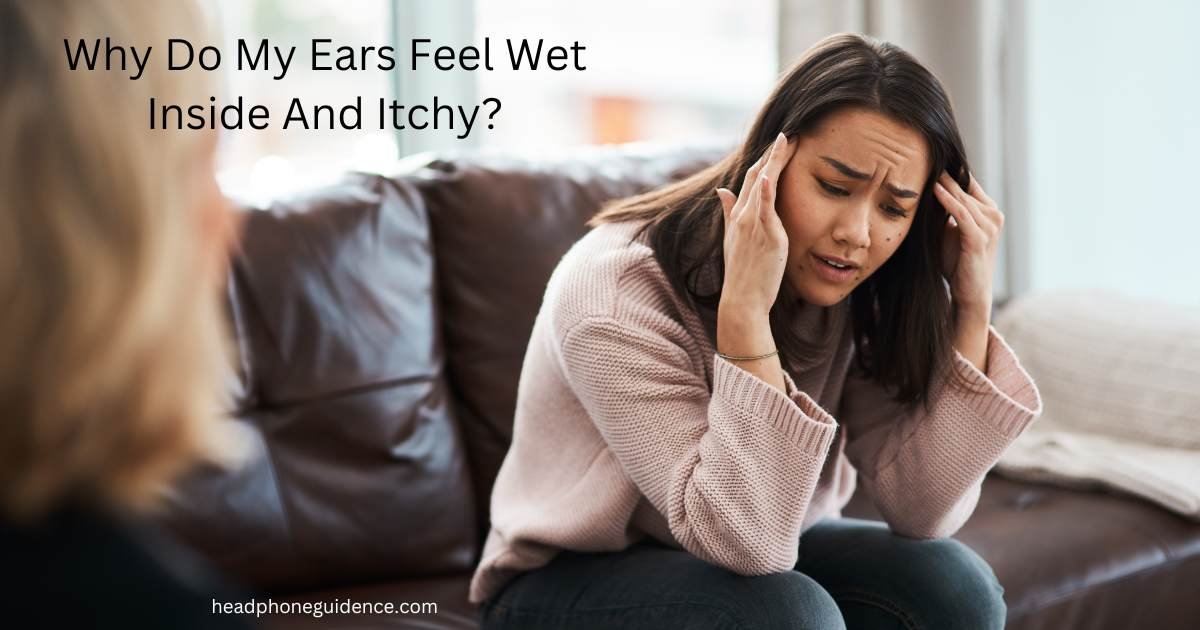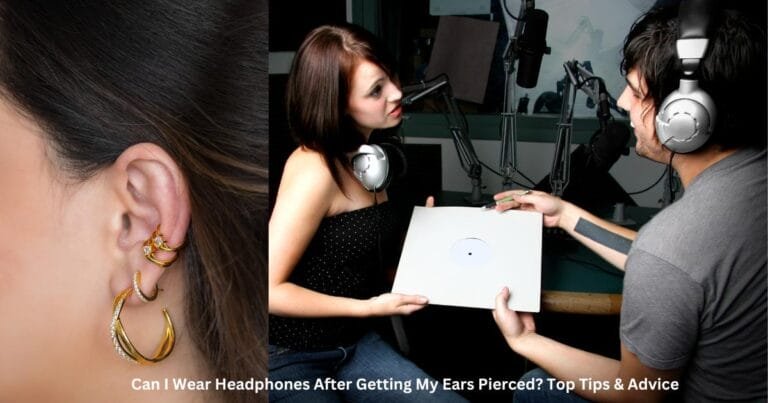Why Do My Ears Feel Wet Inside And Itchy?
Have you ever experienced the peculiar sensation of your ears feeling mysteriously wet on the inside, accompanied by an annoying itch that just won’t go away? It’s a perplexing and uncomfortable situation that can leave you wondering about the underlying causes and how to find relief. In this exploration, we’ll dive deep into the fascinating world of ear health and hygiene, unraveling the reasons why your ears might feel wet and itchy inside. Whether it’s a temporary annoyance or a persistent issue, understanding the potential culprits and seeking the right solutions is essential to restoring comfort and clarity to your auditory world.


Why do my ears itch?
Causes and Treatments
The relentless itchiness deep within your ears can be an exasperating experience. It’s annoying and can indicate underlying issues that demand attention. In this article, we will explore the various causes of itchy ears and the most effective treatments to find relief and maintain ear health.
Causes of itchy ears:
-
Earwax Buildup: Earwax, or cerumen, is a natural substance the ear produces to protect and clean it. However, an excessive buildup of earwax can lead to itching. This buildup can occur due to improper cleaning, using cotton swabs, or even genetic factors.
-
Allergies: Allergic reactions to pollen, dust, pet dander, or certain foods can manifest as itching in various body parts, including the ears.
-
Fungal Infections: Fungal infections like otomycosis can affect the ear canal and cause itching. These infections often thrive in warm and humid conditions.
-
Bacterial Infections: Bacterial infections can lead to itching, pain, and discharge from the ear. These infections usually follow a swim in contaminated water or occur due to minor injuries.
-
Skin Conditions: Skin conditions like eczema and psoriasis can extend to the ear canal, causing irritation and itching.
-
Insect Infiltration: Insects can sometimes find their way into your ear canal, triggering a severe itch and discomfort. Attempting to remove them can exacerbate the problem, so seeking medical help is essential.
-
Contact Dermatitis: Allergic reactions to substances like hair dyes, shampoos, or earrings can cause itching in and around the ears.
Treatments for itchy ears:
-
Ear Drops: Over-the-counter ear drops, such as those containing hydrogen peroxide or olive oil, can help soften and loosen earwax, making it easier to remove. Avoid inserting cotton swabs or foreign objects into your ears, which can push the wax further.
-
Allergy Management: Identify and manage allergens that trigger itching. Antihistamines, both oral and topical, can provide relief from allergic reactions.
-
Antifungal Medications: Your doctor may prescribe antifungal ear drops or oral medications if a fungal infection is the culprit.
-
Antibiotics: Bacterial infections require treatment with antibiotic ear drops or oral antibiotics prescribed by a healthcare professional.
-
Corticosteroids: For skin conditions like eczema and psoriasis affecting the ears, corticosteroid creams or ointments may alleviate itching and inflammation.
-
Insect Removal: If you suspect an insect has entered your ear, it’s crucial to seek medical assistance. Attempting to remove it yourself can lead to injury or push the insect deeper.
-
Avoid Irritants: If contact dermatitis is the cause, identify and avoid the irritant substance, and consider using hypoallergenic products.
Preventive measures:
- Avoid inserting foreign objects or cotton swabs into your ears, as this can push earwax deeper or cause injury.
- Maintain good ear hygiene by gently cleaning the outer ear with a washcloth, avoiding excessive earwax removal.
- Use earplugs or a swim cap to protect your ears from excessive moisture, especially when swimming.
- Consider regular check-ups with an audiologist or ear specialist if you have recurring ear issues.
In conclusion, itchy ears can result from various causes, from earwax buildup to allergies and infections. Identifying the underlying cause and seeking appropriate treatment is crucial for finding relief and preserving your ear’s health. Remember to consult a healthcare professional for a proper diagnosis and guidance on the most effective treatment for your condition. Your ears deserve the care and attention needed to keep them itch-free and in optimal working condition.
Why are my ears wet and itchy when I wake up?
Waking up to wet and itchy ears can be quite the perplexing start to the day. But fear not, for this peculiar phenomenon has an intriguing explanation. You see, our ears are engaged in a subtle yet essential self-cleansing process during the night.


As we sleep, our ears continue to produce earwax, also known as cerumen, which plays a crucial role in safeguarding our auditory health. Earwax functions as a protective barrier, trapping dust, debris, and potential invaders and preventing them from reaching the delicate eardrum. However, this wax doesn’t just sit idly; it gradually migrates from the ear canal towards the ear’s entrance.
Now, here’s where the magic—or rather, the wetness—happens. When you lie down to sleep, gravity no longer aids the natural flow of earwax. Instead, it can accumulate near the ear’s entrance, making you more aware of its presence when you wake up. This accumulated wax might feel moist and sticky, leading to the sensation of wet ears.
But why the itchiness, you ask? Well, the moisture can soften the skin inside your ear canal, making it more prone to irritation and itching. Plus, if you’re a side sleeper, your ear may come into contact with your pillowcase, which can introduce allergens or create friction that triggers itching.
So, what can you do to ease this morning’s conundrum? Firstly, resist the urge to insert cotton swabs or any foreign objects into your ears; doing so can push the wax deeper or even damage your eardrum. Instead, consider gentle ear hygiene practices. A warm, damp washcloth can help clean the outer ear, while over-the-counter ear drops designed to soften earwax can aid in its natural migration out of the ear canal.
In conclusion, waking up with wet and itchy ears is usually nothing to be concerned about. It’s merely your body’s way of maintaining ear health while you catch some Zs. Embrace the marvel of your self-cleansing ears, and if discomfort persists or worsens, consult a healthcare professional for personalized guidance. Now, with a newfound understanding of your ear’s nightly adventures, you can start your day with a sense of wonder rather than worry.
Why do my ears feel wet inside at night?
Our bodies are incredibly complex, and many physiological processes continue even when we’re asleep. One such process involves producing and managing earwax, also known as cerumen. Earwax plays a crucial role in keeping our ears clean and protecting them from foreign invaders like dust and bacteria.


Throughout the day, as we move and engage with our environment, earwax naturally migrates from the deeper parts of the ear canal toward the ear’s entrance. However, when we lay down to sleep at night, gravity no longer assists in this migration. As a result, earwax may accumulate closer to the ear canal’s entrance, giving you the sensation of wetness inside your ears.
But what about the wet feeling? This is often due to the body’s temperature regulation mechanisms. As we sleep, our body temperature tends to drop slightly, causing a cooling effect. This change can lead to condensation, where moisture from the surrounding air can accumulate on the skin inside your ear canal, making it feel damp.
Now, let’s address the itchiness that can sometimes accompany this sensation. The dampness inside the ear can soften the skin and create an environment where itching is more likely to occur. Additionally, if you’re a side sleeper, your ear might come into contact with your pillowcase or bedding, which could introduce allergens or cause friction, further contributing to the itchiness.
What can you do if you wake up with wet and itchy ears? The key is to avoid inserting objects like cotton swabs into your ears, which can push the earwax deeper or damage your ear canal. Instead, opt for gentle ear hygiene practices. You can use a warm, damp washcloth to clean the outer ear and help alleviate any discomfort.
What home remedy can I use for itchy ears?
Here are some home remedies you can use for itchy ears in bullet form:
-
Apply a warm, not hot, compress to the affected ear to soothe itching and reduce inflammation.
-
Place a few drops of warm olive oil in your ear to help soften and remove ear wax that might be causing the itching.
-
Dilute hydrogen peroxide with equal parts of water, and use a dropper to put a few drops in the ear to help remove excess earwax.
-
To combat fungal infections, mix apple cider vinegar and water in equal parts, and apply a few drops to the ear with a dropper.
-
Identify and avoid irritants that could trigger the itching, such as harsh shampoos, soaps, or earrings.
-
Use earplugs when swimming or showering to prevent excess moisture in the ears.
-
Use a warm washcloth to clean the outer ear, avoiding inserting anything into the ear canal.
-
Consider over-the-counter ear drops specifically designed for itching and irritation.
Remember, if your itchy ears persist, worsen, or are accompanied by pain, discharge, or hearing loss, you must consult a healthcare professional for a proper diagnosis and treatment.


Conclusion
About: Why Do My Ears Feel Wet Inside And Itchy?
It’s essential to recognize that our ears are not passive entities but dynamic organs engaged in continuous self-maintenance. The accumulation of earwax, changes in body temperature, allergens, and even our sleeping positions all contribute to this curious phenomenon.
While it may be tempting to reach for quick solutions, such as cotton swabs, resisting the urge is crucial, as improper handling can lead to complications. Instead, adopting gentle home remedies like warm compresses, olive oil drops, or diluted hydrogen peroxide can often relieve and promote ear health.







